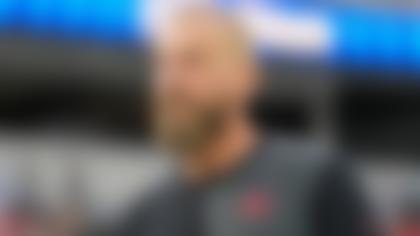Don Coryell wasn't a big man. In the world of professional football, his stature was more akin to the person who hands out towels and dispenses water to the players than the man who leads them.
Coryell talked funny, too. Not the way one would normally expect the man in charge of the team to talk.
"He sounded like Daffy Duck," Conrad Dobler, an offensive guard for Coryell on the St. Louis Cardinals, said of his former coach's pronounced lisp.
Yet, when it came to making his mark on the NFL, Coryell wasn't held back by his lack of size or his speech impediment. He held nothing back, either, in creating one of the most dynamic offensive schemes the game has ever seen.
That was the largest part of the legacy that Coryell's former players were happy to celebrate after receiving the sad news Thursday night of his passing at age 85.
"He was a little guy in stature, and he liked nothing better than putting the haymaker on the big guy," said Dan Fouts, Coryell's Hall of Fame quarterback with the San Diego Chargers.
Only the knockout punch wasn't from a fist. It came in the form of an offense dubbed Air Coryell. It featured long passes, quick-strike touchdowns, points galore and a whole lot of excitement.
Like any other player, Fouts wanted only one thing from the man responsible for putting together the game plan and making the calls from the sideline: plays that worked. After all of the sweating and toiling in training camp and through each week of practice, that had to be the payoff.
Will Coryell be enshrined in Canton?
During a chat with fans Friday, Vic Carucci addressed why Don Coryell isn't in the Pro Football Hall of Fame and the chances that will change in the future. **More ...**
And in most cases with Coryell, it was, most notably during the 1970s and 1980s in San Diego.
"Our greatest day would be on Wednesday, when we'd get the game plan," Fouts said. "We'd come out of that offensive meeting, and when we hit the practice field, we'd be sky high because we knew, 'Oh, this one's going to score ... oh, yeah, that one will get us a first down ... oh, boy, can't wait for that opportunity.' And we'd carry on like that Wednesday, Thursday, Friday and Saturday. Then, on Sunday, it was like, 'Hey, we've scored on this play four times already.'"
Coryell's pass-happy approach -- which did plenty to allow Fouts, tight end Kellen Winslow and wide receiver Charlie Joiner to put up numbers that led to their entry to the Pro Football Hall of Fame -- didn't work because of creatively positioned Xs and Os. As the players and coaches (and Coryell was responsible for launching the career of some great ones, including Joe Gibbs and John Madden) who embraced it through the years discovered, it was much more than a form of strategy.
"It's an attitude of attack," Fouts said. "We're going to attack every part of that field -- width, length -- and then we're going to attack every weakness in that defense. It's like (fast breaks in) basketball. Three-on-two, then it comes down to a two-on-one, and then it's a one-on-none. Throw the ball to the one-on-none. It was the attitude of, 'Look for the bomb first, and then work your way back to the line of scrimmage.'
More on Coryell
Don Coryell was a true football pioneer and it shouldn't go unnoticed he started a coaching tree as deep and varied as any ever founded, writes Brian Baldinger. **More ...**
Related:
»
Chargers mourn loss of a legend
» Carucci:
Coryell made his mark
» Davis:
Coryell's impact lives on
Video:
"He believed in scoring and scoring a lot and as often as possible. Nothing pleased him more than a touchdown pass. That was his baby."
With Coryell, defense wasn't much of a priority. That was why he counted on his offense to score enough to make up for all of the points that the defense allowed, in no small part because the quick scores wouldn't allow the defenders to have much rest.
Simply put, Coryell was too consumed with figuring out how to exploit defenses to worry about stopping the opposing offense from doing the same.
Fouts called Coryell "unique in so many ways." However, it wasn't merely in the coach's approach to the game but also in his approach to his players.
Unlike many coaches, especially in the earlier days, Coryell wasn't a strict disciplinarian. Far from it. He would allow his players to have plenty of leeway, as long as they performed when it counted.
For instance, Coryell was never a stickler for players keeping their helmets on with their chin straps snapped during practice, especially in the scorching heat of training-camp two-a-days.
"Coryell would say, 'Hey, listen, if you're not in the play, take your helmet off, get yourself some water, and I want you to take a knee back there and I want you to watch the plays and learn what the other people are doing,'" Dobler recalled. "He wanted us to concentrate rather than worrying about whether our chin strap was too tight or our helmet was too hot.
"Don Coryell actually taught me that football is supposed to be fun. Yeah, it's a business, but it's game. It's a professional game, but it's a game. We used to laugh out on the field, and Coryell would say, 'You guys are having a blast.' He loved us."
Dobler, known as one of the dirtiest players in NFL history for often employing tactics that were against the rules, remembered Coryell's relatively docile reaction when the guard drew a 15-yard penalty. On the sideline, Coryell asked offensive line coach Jim Hanifan what Dobler did. Hanifan replied, "He kicked the guy in the ass." Coryell said, "Well, tell him not to do that anymore."
Fouts last saw Coryell in November during a Chargers 50th anniversary celebration at a game in San Diego. "The great thing was that there were so many players who came back for it," Fouts recalled.
Fouts had often spoken to Coryell by phone. Their conversations were more frequent and lasted longer during the time leading up to last February's meeting of the Pro Football Hall of Fame selection committee. Coryell was among the final 15 candidates, and Fouts pushed hard for his former coach to join him in Canton. It didn't happen.
In the last couple of months, as Coryell's health steadily declined, there would be no more conversations.
Now, there are plenty of memories, most of which are fond. The explosive offenses Coryell put together. The enjoyment he allowed his players to have. The man who is much larger than he looked at first glance.
"Once you worked with him and realized his passion for the game, his enthusiasm for the game, and his knowledge of the game, he was 6-foot-6, 250 pounds of golden, Adonis body," Dobler said. "He was the type of guy that you'd go into the alley with and you knew he'd stand by you."



